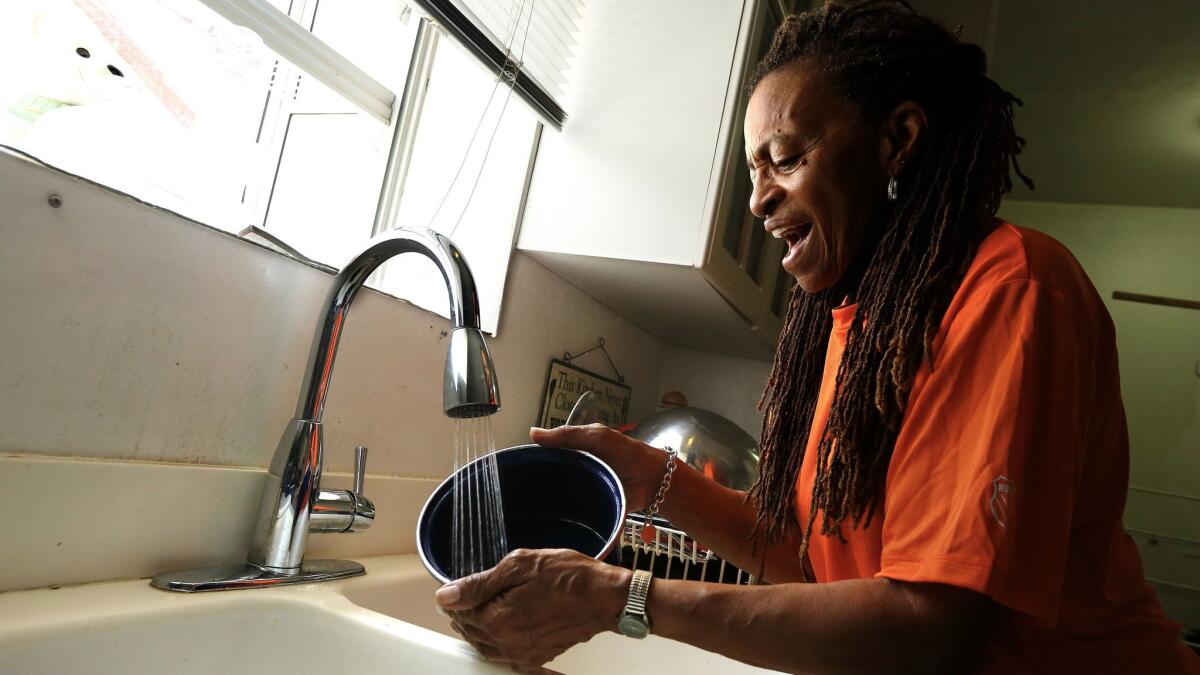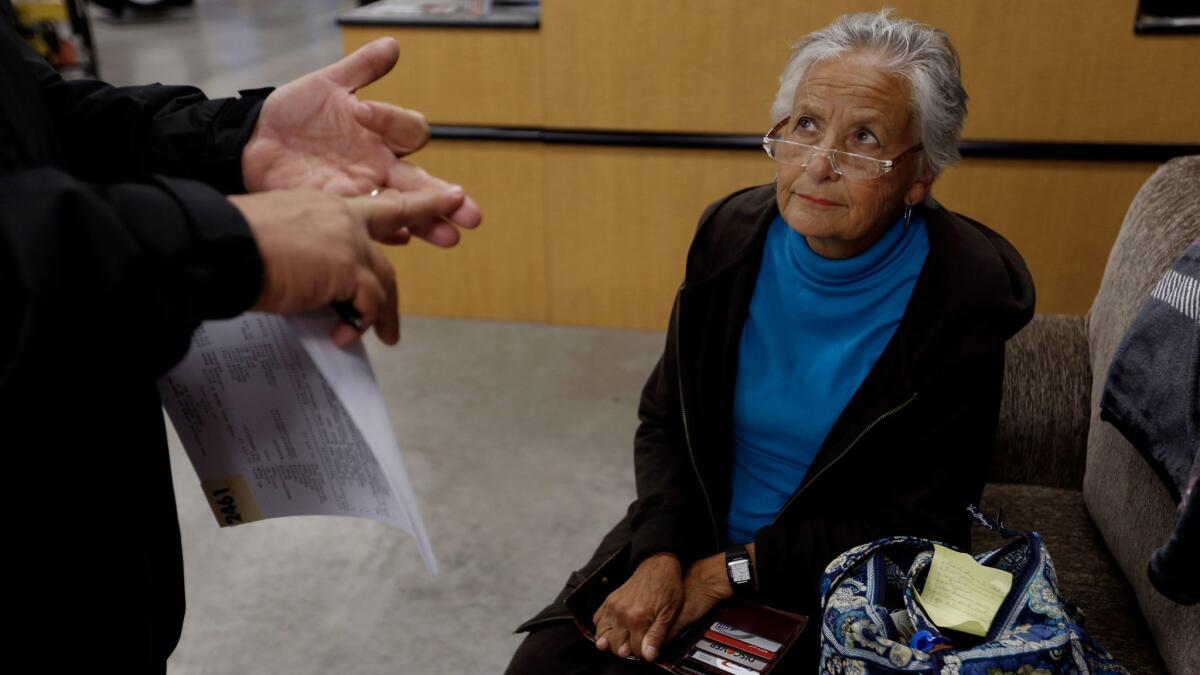Column: Not rich, not poor, and not ready for the cost of growing old

- Share via
Caroline from Sierra Madre wrote to me about the “five-year-long funeral” that followed her father’s stroke, saying “he retired a member of the middle class and died impoverished after all the family funds were spent on care.”
Art from Studio City wrote about his 96-year-old father, who has dementia and whose bank account “is evaporating at a fast pace because of the cost of caregivers, food, medicine and daily expenses.”
Dick from Long Beach told me he’s 84, his wife is 82, and they’re “hung up on the financing of our old age.”
They were among a small army of readers who responded to my Nov. 20 column about my 87-year-old mom’s failing health and the tough choices families are forced to make.
Many thanks, by the way, for all the well wishes. To update the situation, my mother — who did not look long for this world — has improved physically and mentally since her release from the hospital.
The San Francisco Bay Area doctors and nurses who cared for her seemed to be good at what they do individually, but they didn’t do a great job of communicating with one another or our family. None of them told us in the hospital that dementia can be temporarily worsened by infections. We were left with the impression that delirium was my mother’s new state. She’s still got a few major health problems, but she became much less disoriented once she was home, and a gerontologist told us that’s not uncommon after an infection is treated.

It’s ever more clear to me that getting old, or helping someone who is aging, can be a full-time job. In our family, that job is done primarily by my sister, who just marked the 10th anniversary of ovarian cancer by checking into the hospital again for her fourth brain surgery. But remarkably, despite eight years of metastatic brain tumors, she’s still full of fight.
A nurse named Julia — who recently lost her mother — emailed me with a line that’s making more and more sense to me lately: “Getting old isn’t for sissies.”
And here’s the thing:
Boomers are crowding the retirement turnstiles just as safety nets may get a haircut from a Republican Congress fixated on an Obamacare repeal that could whack Medicare and Medicaid. And although President-elect Trump has defended entitlements, a key advisor once called for privatizing Social Security. California has been a national leader in supporting in-home care and expanding medical insurance to wider populations, but federal funding cuts could jeopardize those advances.
“Everything is a wild card right now,” said UCLA professor Steven Wallace, chair of the school’s Department of Community Health Sciences.
Wallace co-authored a report published last year on what he refers to as California’s “hidden poor,” approximately 655,000 older adults who are above the federal poverty level and ineligible for some government programs, but not wealthy enough to live comfortably in a region with such high housing costs.
I know those people. I’ve met many of them and written about some of them.
Doris Tillman comes to mind. She’s the South Los Angeles retiree who went nine months without running water after losing a job and falling behind on a Los Angeles Department of Water and Power bill she disputed.
“I’m going to write a book about how to survive in L.A. without water,” the 71-year-old Tillman told me at the time. She learned to get by on 50 gallons a week of water she purchased, lugging heavy five-gallon jugs into and out of her car and into her home.
Another story comes to mind — the one on 79-year-old Dolores Westfall last January by John Glionna and photographer Francine Orr. The headline was “Too poor to retire and too young to die,” and the story chronicled the travels of Westfall, who left her California home and lived in an RV she called Big Foot. For seven years, she roamed the country, moving from one temporary job to another.
“She endures what for many aging Americans is an unforgiving economy,” said the story. “Nearly one-third of U.S. heads of households ages 55 and older have no pension or retirement savings and a median annual income of about $19,000.”
Westfall died just before Christmas.
Orr and I have been talking for several months about teaming up on a series of stories about the hard choices Californians make in middle age and later on, and it was she who directed me to the UCLA research by Wallace and his cohort, D. Imelda Padilla-Frausto. The research found that people of color were harder hit, that the hidden poor had more health problems than the general population but less access to care, and that those people were more likely to suffer from depression.
Women are particularly hard hit, Wallace said, partly because they often survive their husbands but lose their pensions.
“The expenses don’t drop as much as the income does, so you’ve got older women — particularly in their 80s — who may have the family home paid off, but the roof is leaking and the water heater goes out, and they don’t have the money to fix them,” said Wallace. “So they’re downsized into apartments, where they’re struggling to pay the monthly rent.”
If you’re in that kind of situation, or know someone who is, shoot me an email. Orr and I are gearing up to chase stories around the state, to keep an eye on policy decisions in Washington and Sacramento, and to take a close look at programs and policies that can help people in need.
By the way, in my November column, I referred readers to the SCAN Foundation but gave an incomplete website address. Go to www.thescanfoundation.org, click on Aging Well, and you’ll find piles of good planning advice.
And thanks again to all of you who sent kind thoughts and words of support for my mom.
Get more of Steve Lopez’s work and follow him on Twitter @LATstevelopez
ALSO
Pentagon says it will waive bonus repayments for vast majority of California National Guard soldiers
Charles Manson seriously ill, moved to hospital, sources say
YouTube daredevil breaks feet jumping off Laguna Beach hotel, asks for money
More to Read
Sign up for Essential California
The most important California stories and recommendations in your inbox every morning.
You may occasionally receive promotional content from the Los Angeles Times.











